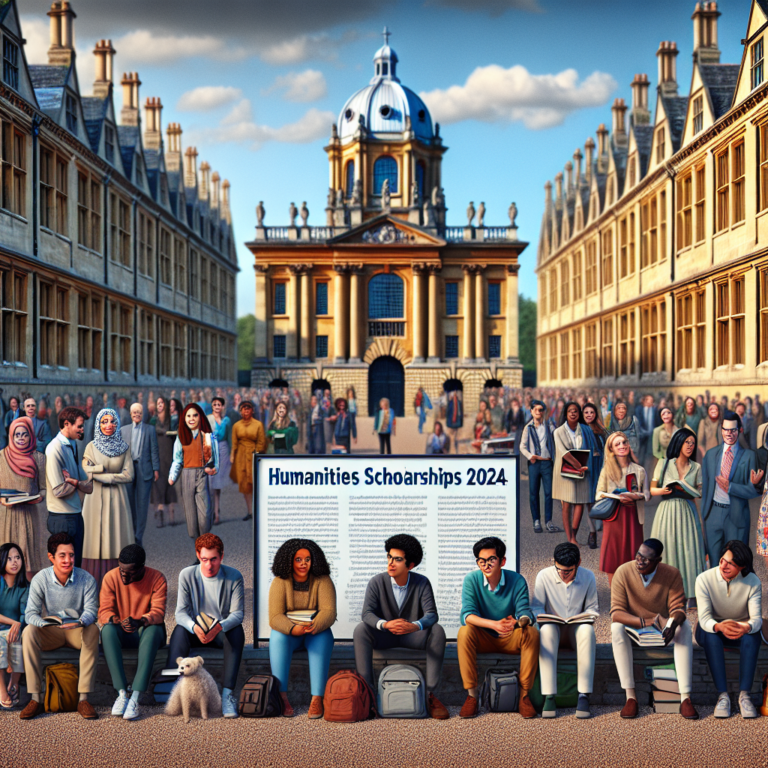
Humanities Scholarships: A Story of Passion, Persistence, and Finding Your Path
I remember sitting there, a freshly accepted university student, staring at the tuition bill that felt less like a piece of paper and more like a mountain range I was expected to climb without a rope. My heart was set on studying literature, history, philosophy – the kind of subjects that make your soul hum, that challenge you to think deeply about what it means to be human. But my practical brain, the one constantly whispering worries about rent and ramen, kept asking, "How are you going to pay for this, kid? Who even funds someone who just wants to read old books and ponder big questions?"
It felt like a lonely corner to be in. Everyone else seemed to be chasing degrees in STEM or business, fields where the path to a high-paying job, and by extension, seemingly, a scholarship, felt clearer. But I wasn’t built for coding or corporate strategy. My mind thrived in the dusty archives, the lyrical verses, the nuanced arguments that had shaped civilizations. I believed, fiercely, that understanding our past, our stories, our very nature, was just as vital as any scientific breakthrough. The problem was, belief doesn’t pay the bills.
That’s when I stumbled, quite accidentally at first, into the world of humanities scholarships. It wasn’t a sudden, grand revelation, more like finding a hidden spring in a parched landscape. And let me tell you, that discovery changed everything. It wasn’t just about the money; it was about validation, about realizing there were people, institutions, and foundations who believed in the power and importance of the humanities as much as I did. They were willing to invest in young minds eager to explore the depths of human experience.
So, what exactly are these humanities scholarships I speak of? Think of them as a lifeline for students like us, those drawn to subjects like English literature, history, philosophy, languages, religious studies, art history, cultural studies, anthropology, archaeology, classics, and even creative writing. These aren’t just handouts; they’re investments in critical thinking, nuanced understanding, empathetic engagement, and the preservation and interpretation of our shared human heritage. They’re designed to ease the financial burden of tuition, books, living expenses, and sometimes even research travel, allowing you to immerse yourself fully in your studies without the constant hum of financial anxiety in the background.
My early days of searching were a bit haphazard, I’ll admit. I started with the big, generic scholarship databases, typing in "humanities scholarships" and bracing myself for a deluge. And a deluge there was, but it was often overwhelming, filled with criteria that didn’t quite fit, or deadlines I’d already missed. It felt like trying to find a specific seashell on a mile-long beach. That’s a common first step for many, and it’s not entirely useless, but it’s definitely not the most efficient.
The real game-changer came when I learned to narrow my focus. My university’s financial aid office, a place I initially thought was just for loans, turned out to be a goldmine. They had a list, not always perfectly organized, of departmental scholarships specific to literature, history, and philosophy majors. These were often smaller awards, sometimes just a few hundred or a couple of thousand dollars, but they added up. And critically, the applicant pool was much smaller. Imagine applying for a literature scholarship where only other literature students are competing – your odds instantly skyrocket compared to a national scholarship open to all majors.
I remember chatting with Professor Davies, my favorite history professor, after one of his lectures. I was nervous, but I just blurted out, "Professor, I really want to dive deep into medieval history, but the costs are daunting. Do you know of any scholarships for history majors?" He smiled, a kind, knowing smile, and directed me to a bulletin board I’d walked past a hundred times without really seeing. Tucked among dusty flyers for study groups were announcements for the "Dr. Eleanor Vance Memorial Scholarship for Aspiring Historians" and the "Classics Department’s Research Grant for Latin Scholars." These were often funded by alumni or local foundations passionate about a specific discipline. It taught me a crucial lesson: talk to your professors. They are often your best allies, connected to resources and opportunities you’d never find online. They might even know of scholarships that don’t get widely advertised because they’re looking for just the right student.
Beyond the university walls, the search became more adventurous. I started looking at professional organizations related to my fields of interest. For history, that might be the American Historical Association or local historical societies. For literature, it could be organizations dedicated to specific genres or authors. Many of these groups offer funding for undergraduate research, graduate studies, or even conference attendance – all experiences that enrich your academic journey and look fantastic on a resume. Don’t forget cultural institutions, either. Museums, libraries, and heritage foundations often have their own scholarship programs, particularly if your interests align with their mission. Think about the local art gallery offering a scholarship for art history majors interested in local artists, or a public library supporting students passionate about literacy and archival preservation.
Then there are the big, external foundations. These are the ones that require more effort, a more polished application, but the rewards can be substantial. Think about foundations focused on promoting specific cultural understanding, international relations, or social justice through the lens of humanities. Finding these requires a bit more digging, often through aggregated online databases, but the key is to be specific with your search terms. Instead of "humanities scholarships," try "scholarships for cultural studies research" or "grants for language immersion programs." The more niche you get, the better your chances of finding a perfect match.
Now, let’s talk about the application itself, because this is where a humanities student truly shines. We are, after all, masters of storytelling. This is your moment to tell your story.
The essay, for instance, is not just a formality; it’s your voice, your passion, laid bare. I remember one scholarship I applied for, asking "Describe a book that profoundly changed your perspective." This wasn’t a trick question; it was an invitation. Instead of summarizing the plot, I wrote about how a single passage in Gabriel Garcia Marquez’s One Hundred Years of Solitude opened my eyes to the cyclical nature of history and the enduring power of narrative. I didn’t just explain what it changed, but how it made me feel, how it made me see the world differently, and how that experience fueled my desire to study literature even further.
My advice for your scholarship essays is simple: be authentic. Don’t try to guess what the committee wants to hear. Tell them what you genuinely feel and think. What sparks your intellectual curiosity? Is it the forgotten voices in history, the philosophical dilemmas that keep you up at night, the beauty of a foreign language, or the way art reflects society? Weave in personal anecdotes that illustrate your passion. Maybe it was a childhood visit to a museum that ignited your love for art history, or a powerful speech you heard that pushed you towards political philosophy. Show, don’t just tell. Instead of saying "I am passionate about history," describe the thrill of uncovering a primary source document, the goosebumps you get from standing on historically significant ground.
Another crucial component is the letter of recommendation. This isn’t just a professor signing their name. This is an endorsement, a testament to your character and academic potential from someone who knows your work intimately. Build relationships with your professors early. Participate in class discussions, go to office hours, ask thoughtful questions. When the time comes to ask for a letter, they’ll have actual material to work with, not just a grade sheet. Give them plenty of notice, provide them with your resume, your personal statement, and details about the scholarship you’re applying for. Make it easy for them to write a compelling letter that highlights your unique strengths as a humanities scholar.
Of course, your academic record, your GPA, matters. But it’s not the be-all and end-all, especially in the humanities. Scholarship committees often look for more than just straight A’s. They want to see intellectual curiosity, growth, and a genuine engagement with your field. If your GPA isn’t perfect, perhaps you can explain an upward trend, or mention how challenging circumstances affected an early semester. Don’t shy away from explaining your journey. Many scholarships are looking for potential and resilience, not just perfection.
And what about extracurriculars? You might think, "I’m a humanities student, I don’t have a robotics club or a debate team." But you do have things that matter! Did you volunteer at a local library or historical society? Are you part of a campus literary magazine? Do you tutor younger students in English or history? Have you organized a film club that explores international cinema? Even seemingly unrelated activities can be framed to show critical thinking, leadership, communication skills, and a commitment to your community – all qualities highly valued by scholarship committees. Remember, humanities students often excel in areas like communication, critical analysis, ethical reasoning, and cross-cultural understanding. Highlight these transferable skills!
One thing I learned the hard way is to be persistent. You will face rejection. I certainly did. Applications that took hours to craft sometimes met with a polite "Thank you for your interest, but…" It stings, no doubt. But you can’t let it derail you. Each rejection is a lesson. Re-read your essay, see if there are areas to improve. Maybe the scholarship wasn’t the right fit after all. The key is to keep applying. Think of it like a numbers game, but one where your odds improve with each thoughtful application.
And don’t forget the niche scholarships. These are often diamonds in the rough. Are you a first-generation college student interested in philosophy? There are scholarships for that. Are you a woman pursuing a degree in classics? Absolutely. Are you from a specific ethnic or cultural background, or do you have a unique skill like speaking a rare language? There are foundations and organizations dedicated to supporting students with diverse backgrounds and specialized interests. Sometimes, these niche scholarships have even smaller applicant pools, making your chances of success significantly higher. It takes a bit more digging, a bit more specific keyword searching, but the payoff can be immense.
Looking back, receiving those scholarships wasn’t just about the money. It was about the profound sense of relief, the freedom to truly engage with my studies. It meant I could spend more time in the library, less time worrying about my next shift. It allowed me to take on an unpaid research assistantship that deepened my understanding of primary sources, rather than having to take a retail job. It opened doors to study abroad, immersing myself in the very cultures I was studying.
These scholarships allowed me to pursue a path that, to some, seemed impractical or even frivolous. But to me, and to the generous individuals and institutions who funded my education, it was about nurturing a mind that could analyze, interpret, question, and ultimately, contribute to a richer understanding of our complex world. It’s about ensuring that the voices who want to delve into ancient texts, who want to preserve fading languages, who want to critique societal norms through literature, are not silenced by financial constraints.
So, if you’re out there, a fellow lover of the humanities, feeling that familiar tug between passion and practicality, please know this: your path is valid, and there is support for you. Don’t let the initial daunting cost overshadow your intellectual curiosity. Start digging. Talk to your professors. Craft your story with care and conviction. Be persistent. The world needs your unique perspective, your critical mind, and your empathetic heart. And there are scholarships out there, waiting to help you bring that unique light to the world. It won’t always be easy, but I promise you, finding that support, that validation, is a journey well worth taking. Your passion for the humanities is not a burden; it is a gift, and there are people ready to invest in it. Go tell your story.


